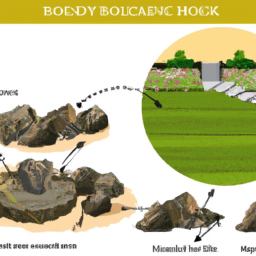How To Redo Rock Landscaping
Table of Contents []
- How To Redo Rock Landscaping
- Overview of Rock Landscaping
- Pros & Cons of Rock Landscaping
- Case Studies
- Frequently Asked Questions
- Mistakes People Make When Redoing a Rock Landscape
- Best Practices for Redoing Rock Landscaping
- Conclusion
- Final Notes
How To Redo Rock Landscaping
How To Redo Rock Landscaping: A Comprehensive Guide
Are you considering redoing your rock landscape? If yes, then you're in luck! This guide provides an in-depth look into how to properly redo your rock landscape, from features and benefits, pros and cons, case studies, FAQ's, mistakes people make, and best practices.
Overview of Rock Landscaping
Rock landscaping is a great way to add beauty, texture, and color to your yard. Rocks come in a variety of shapes, sizes, and colors, allowing you to create unique and eye-catching designs. With the right planning and care, a rock landscape can last for years to come. Here's what you need to know about rock landscaping:
- Features: Rocks are an attractive and durable choice for landscaping. Rocks can be used to create paths, walls, ponds, and water features. Rocks also come in a variety of colors, shapes, and sizes, so you can create a custom design.
- Benefits: Rocks can be arranged in interesting patterns to add visual appeal to your yard. They can also help to reduce soil erosion and provide additional drainage. Rocks can also be used to add texture and color to your landscape.
Pros & Cons of Rock Landscaping
When considering rock landscaping, it's important to understand both the benefits and drawbacks.
Pros
- Rocks are long-lasting and durable
- Can be used to create interesting patterns and designs
- Visually attractive and can add texture and color to your yard
- Variety of shapes, sizes, and colors available
- Can reduce soil erosion and provide additional drainage
Cons
- Can be expensive
- Needs to be maintained regularly
- Can be difficult to install
- May pose safety hazards (e.g. slipping)
Case Studies
To get an idea of how rock landscaping might look in your yard, here are two case studies on how homeowners successfully redid their rock landscapes:
Case Study 1: Hillside Landscaping
One homeowner used a combination of large and small stones to create a stone retaining wall on their hillside. The large stones were arranged in a terraced pattern to create a stepped retaining wall, while the smaller stones were used to create a textured walkway leading up to the hillside. The effect was stunning, and the homeowner was able to retain the strength and stability of their hillside while also adding a beautiful feature to their yard.
Case Study 2: Paving Stones
Another homeowner used paving stones to create a large patio in their backyard. They chose a variety of colors and sizes, and arranged them in an intricate pattern to create an eye-catching effect. The result was an inviting space for entertaining, complete with cushioned seating and outdoor lights.
Frequently Asked Questions
To better understand how to redo rock landscaping, here are some common questions asked by homeowners:
Q: What kind of rocks are best for rock landscaping?
A: The best type of rocks for rock landscaping will depend on your budget and the look you're trying to achieve. Natural stone is the most popular choice, but it can be expensive. Other options include flagstone, river rock, and pavers.
Q: Can I install rock landscaping myself?
A: Installing rock landscaping is a labor-intensive job, and it's best to hire a professional if you don't have the experience or the tools. However, if you're comfortable with DIY projects, then you can definitely attempt it with the proper guidance.
Q: What is the best way to maintain rock landscaping?
A: The best way to maintain rock landscaping is to regularly check for signs of wear and tear, such as cracks or shifting rocks. You should also periodically clean the rocks with a mild soap and water mixture.
Mistakes People Make When Redoing a Rock Landscape
When redoing a rock landscape, there are several common mistakes that people make. Here are some of the most common pitfalls to avoid:
- Using too many different types and sizes of rocks
- Creating an uneven base
- Failing to measure the area and plan ahead
- Trying to do the entire project yourself without enlisting help
- Using the wrong size or type of rocks
Best Practices for Redoing Rock Landscaping
When redoing your rock landscape, there are several precautions you should take to ensure a successful outcome. Here are some best practices to follow:
- Measure your area and plan ahead
- Choose the right type, size, and color of rocks for your design
- Create a level foundation before laying the rocks
- Collect an assortment of rocks to install in a staggered pattern for a more natural look
- Use weed guard underneath the rocks to prevent weeds from growing
- Enlist the help of a professional if needed
Conclusion
Redoing your rock landscape is a great way to add color, texture, and visual interest to your yard. When done correctly, a rock landscape can last for many years. To ensure a successful outcome, be sure to measure and plan ahead, choose the right type and size of rocks, create a level foundation, and enlist the help of a professional if needed.
Final Notes
Redoing your rock landscaping can be a rewarding experience, but it does come with some challenges. Be sure to research and plan ahead, and don't be afraid to enlist the help of professionals if needed. With the right preparation and care, you can transform your yard into a stunning outdoor paradise.

Previous Page
